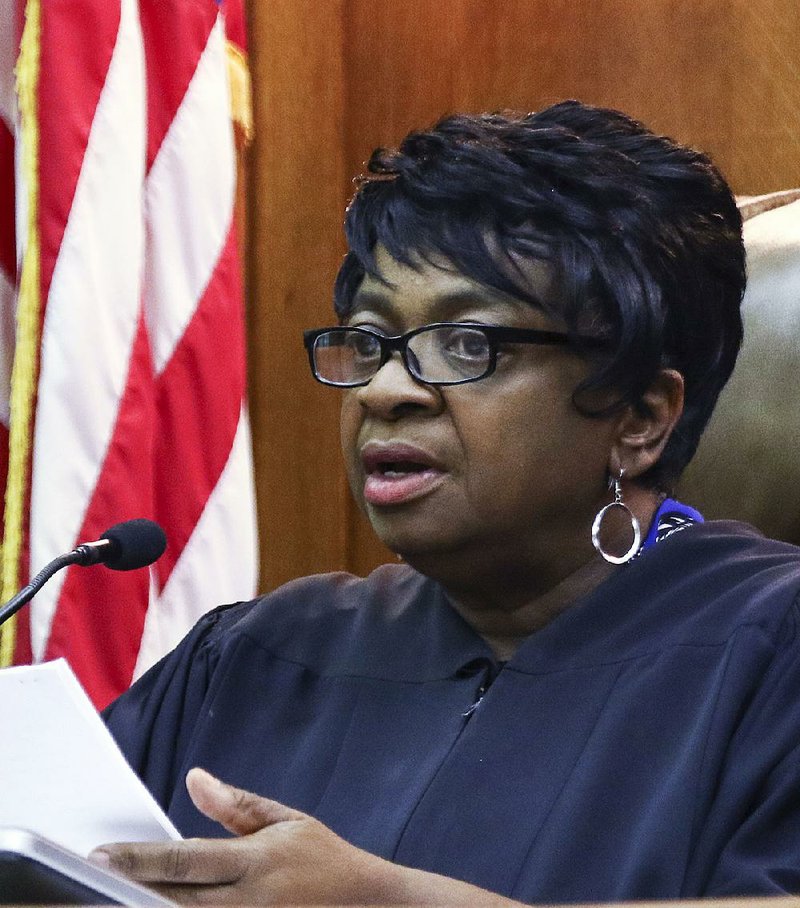The latest legal test over state Republicans' efforts to enact new identification requirements for voting is pushing up against soon-approaching deadlines for the May 22 elections, prompting Secretary of State Mark Martin's office to ask the courts to hurry up.
The top attorney for the secretary of state's office, A.J. Kelly, filed a petition with the Arkansas Supreme Court late Thursday that asks justices to force a Pulaski County circuit judge to issue an order on an injunction request by next Friday. That is the deadline for the office to mail ballots to military members and overseas voters.
Kelly also issued a letter to the circuit judge, Alice Gray, reminding her of the deadline and asking her to rule before it occurs.
Gray responded with a letter to Kelly, imploring patience of Martin and his attorneys.
But in her reply, Gray also wrote that Martin's office had failed to request a hearing in the lawsuit before March 12, and even had objected to holding an expedited hearing on that date. Gray also said she canceled her vacation in late March to dig through more than 1,000 pages of records submitted in the case.
"Rest assured that the Court is working diligently to analyze this matter and reach a decision," Gray wrote in the letter to Kelly. "The Court expects to issue its decision several days before April 6, 2018."
A spokesman for the secretary of state's office declined to comment on Gray's letter. Kelly did not return a request for comment.
The lawsuit in Gray's court was filed Feb. 7 by a Pulaski County poll worker, Barry Haas, who argues that a new law requiring voters to present photo identification at the polls, or make sworn statements attesting to their identities, violates the Arkansas Constitution.
In his lawsuit, which names Martin and the state Board of Election Commissioners as defendants, Haas seeks to have the law, Act 633 of 2017, ruled unconstitutional. He is also seeking a preliminary injunction to block the law from being implemented during the primaries. (Primary voters also will cast ballots in the nonpartisan judicial election and some school elections on May 22.)
The lawmakers who opposed the passage of Act 633 -- mostly Democrats -- argued it places additional requirements on voting other than what is mandated in the Arkansas Constitution: being a U.S. citizen and Arkansas resident who is over the age of 18 and registered to vote. Additional requirements could discourage some voters, including the poor and elderly, from voting, critics say.
The director of state Board of Election Commissioners, Keith Rutledge, has testified that no one has submitted complaints about not having their votes counted since the act went into effect last August, though several special elections have been held since then. Martin has filed a motion to dismiss the lawsuit.
Exhibits filed with the court earlier this month, however, show that two Pope County voters were made to cast provisional ballots that ended up not being counted during a recent special election.
Haas' attorney, Jeff Priebe, said the lawsuit deals with how the votes are counted once the May 22 primary ends, so the election shouldn't be affected if the judge's ruling comes after the mailing of absentee ballots.
"If it was such a big deal, they should have raised it when [the lawsuit] was filed" on Feb. 7, Priebe said. "The judge has said she's going to rule. I don't know why they will not believe the judge and wait for her to rule."
The Supreme Court has given Haas' attorneys until noon Wednesday to respond to the secretary of state's office's motion to expedite the ruling.
A previous Arkansas law requiring voters to show identification at the polls was struck down by the state Supreme Court in 2014.
Republicans advocating Act 633 say it differs from the earlier law by allowing voters to bypass the identification requirement by signing sworn statements as to their identity. The voters then cast provisional ballots. As a safeguard in case the new law is struck down, Republican lawmakers also placed a proposed constitutional amendment on the Nov. 6 ballot, Issue 2, to include voter-ID requirements in the constitution. The proposed amendment would have to be approved by voters in order to take effect in subsequent elections.
In court filings, Haas has said he has the necessary identification so he can vote, but refused to show it during a 2014 election and later found out his vote was not counted. He did not respond to a message left seeking comment Friday.
Acceptable forms of identification that meet the requirements of Act 633 include a driver's license or photo ID, concealed-handgun license, a passport, military ID, Arkansas college or university ID, or a public assistance card. The secretary of state's office is required to provide free voter-identification cards to anyone who doesn't have an acceptable ID.
"It's been situations of people trying to make a point," said Rep. Mark Lowery, R-Maumelle, of the few reported problems with voters. Lowery was the main sponsor of the House bill that became Act 633. He said the new law was likely to survive a court challenge.
According to the National Conference of State Legislatures, 34 states have enacted some form of voter-ID laws. The group lists Arkansas as one of 24 states with "non-strict" requirements. The 10 states with "strict" laws require voters lacking necessary identification to take extra steps after an election to ensure their votes are counted.
A Section on 03/31/2018

